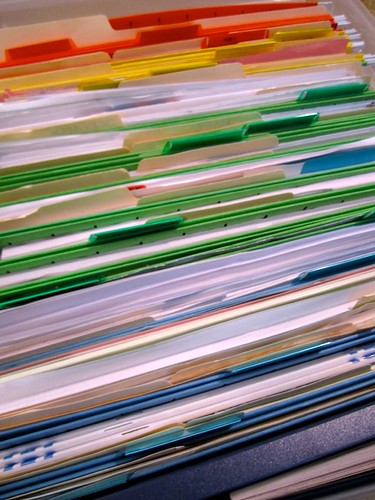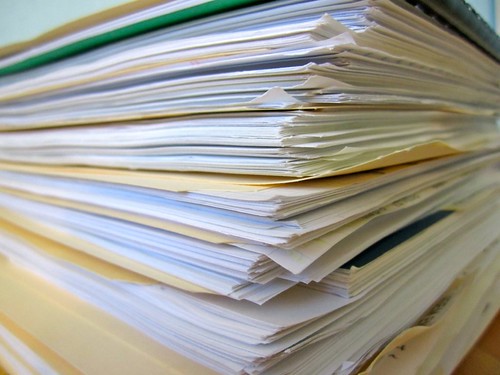
My office had a company-wide clean up event last week. This is important because I love to sort stuff, so it’s like Disneyland in the office for me! But I’ve also discovered, while I am very organized I don’t really like getting rid of things (see last week’s post). As part of this work exercise, I’ve realized that I really need to sort through my papers at home too.
So, I’ve tried to gather some information to create household records retention guidelines for personal and household papers to help with sorting and purging files. Have any more to add? Please add to this list in the comments!
Well before I start, I want to highly recommend scanning important documents. For some things you definitely need the original (social security card), but for most others an e-copy is just fine. Plus it takes up no physical space, and you can always put it on a flash drive and keep your documents in a safe deposit box if you’re worried about someone accessing them. Ok, here we go…
Bank Statements – Shred! If you are buying or refinancing a house, they may ask for up to 3 months of bank statements. These can be either printed from your online banking account or the bank itself should be able to provide them. THERE IS NO REASON TO KEEP THESE! (This internet yell is mostly for me!)
Bills – Keep 3 months, to be able to prove residency status (driver’s license, voter registration, library card, etc). Utility companies can reproduce bills if necessary.
Credit Card Statements – Generally this is available online. However, it’s a good idea to keep 3 months of statements so you can verify your account status
Financial Documents (investments) – Don’t keep unless you plan to act on the information. Again, keep tax-related stuff, but chuck the board of directors vote card you never sent in.
Home Repairs – At least 7 years, or until property is sold. I keep records in a notebook on Evernote.
Instruction Manuals – As long as you own the item. Attach warranty information to manual so it stays together.
Insurance Policies (auto, home) – Minimum 5 years. However, it may be recommended to keep as long as the statue of limitations (in case of late claims)
Insurance Policies (disability, life, umbrella, medical) – As long as policy is in effect, plus three years.
Medical Insurance Bills – 5 years from date of service rendered (7 years if expenses are tax-related)
Medical Records – Keep until you are no longer being treated for the condition. Do you need to keep record of when you had the flu in 1998? No. But if you have a reoccurring or chronic condition, keep everything related to that. Keep immunization records indefinitely.
- It’s good to create a personal health record for each member of the family with contact information for doctors, medical history, immunizations, prescriptions, and allergies. That way everything is easy to access.
Mortgage Documents – Many of these records are in county records. However, still keep everything until the mortgage is paid off (plus a couple years to be safe) and you have a received a satisfaction of mortgage
Paycheck stubs – Again, if you are buying or refinancing a house the bank may ask for up to 12-months of paycheck stubs. My company uses PeopleSoft, so I can log in at any time and see (and print) any of my paychecks for my tenure at the company. If you have access to something like this, shred your pay stubs as soon as you get them. Otherwise, I would keep for 1 year, check against your W2, and then shred.
Receipts – for everyday purchases, toss after checking your bank account to make sure you were charged correctly. For tax related purchases, keep for 7 years.
Taxes – It’s generally accepted to keep tax returns for 7 years. Although IRS has only 3 years from the date you filed your return to audit you (you must have all the back up documentation too)
Vehicle Records – As long as you own the vehicle, plus 1 year after sale
Vital Records (birth certificates, adoption papers) – Keep permanently
Warranties – life or warranty of item.


